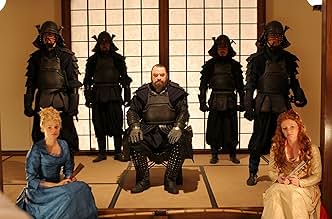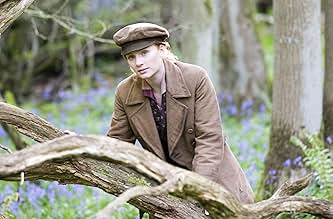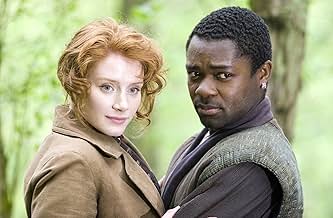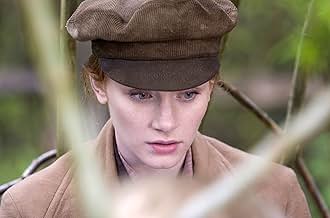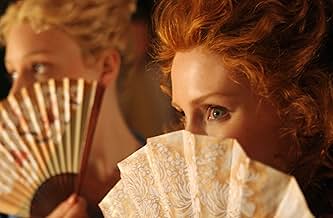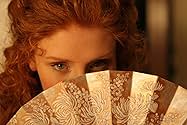IMDb-BEWERTUNG
6,1/10
3819
IHRE BEWERTUNG
Eine Tochter des mächtigen Herzogs muss ihren Mut und Einfallsreichtum unter Beweis stellen, um mit dem Mann zusammen zu sein, den sie liebt.Eine Tochter des mächtigen Herzogs muss ihren Mut und Einfallsreichtum unter Beweis stellen, um mit dem Mann zusammen zu sein, den sie liebt.Eine Tochter des mächtigen Herzogs muss ihren Mut und Einfallsreichtum unter Beweis stellen, um mit dem Mann zusammen zu sein, den sie liebt.
- Auszeichnungen
- 1 Gewinn & 6 Nominierungen insgesamt
Nobuyuki Takano
- Charles
- (as Nobuyuki "Daishi" Takano)
Handlung
WUSSTEST DU SCHON:
- WissenswertesThis was the ninth and final film directed by Kenneth Branagh in which Richard Briers stars. The others are Henry V. (1989), Peter's Friends - Freunde sind die besten Feinde (1992), Swan Song (1992), Viel Lärm um nichts (1993), Mary Shelleys Frankenstein (1994), Ein Winternachtstraum (1995), Hamlet (1996) and Verlorene Liebesmüh' (2000).
- PatzerLions are not native to Japan. The lion is a carryover from the original play, which was set in a generic European country at an indeterminate time in the Middle Ages. Even that didn't make much sense, as lions have been extirpated from the main part of Europe since the 4th century AD, and from the Caucasus since the 10th century. But many Europeans, possibly including William Shakespeare, didn't know that lions weren't around anymore.
- Zitate
Touchstone: The fool doth think he is wise, but the wise man knows himself to be a fool.
- Crazy CreditsThe picture seems to end without the play's Epilogue. Then, the closing credits begin, when they are suddenly interrupted by Bryce Dallas Howard, still in character as Rosalind, who then is seen speaking the Epilogue as she begins to walk to her trailer, drinking a cup of coffee along the way. After the speech, Kenneth Branagh can be heard off-screen saying "Aaaand...cut!" After this, the closing credits resume.
- Alternative VersionenThe version shown on cable television has been formatted to the aspect ratio commonly used in HDTV production (that is, anywhere from 1.78:1 to 1.85:1), while the version released to movie theatres was released in the typical CinemaScope/Panavision aspect ratio (2.39:1). It is the theatrical version which has been issued on DVD. Since the film was made using the Super 35 format, it was possible to make versions of the film in different aspect ratios.
- VerbindungenFeatured in 14th Annual Screen Actors Guild Awards (2008)
- SoundtracksUnder the Greenwood Tree
Composed by Patrick Doyle
Lyrics by William Shakespeare
Performed by Patrick Doyle and London Symphony Orchestra
Ausgewählte Rezension
Seeing As You Like It, William Shakespeare's romantic comedy of mistaken identity brought back memories of an amateur production of the Carousel Theater here in Vancouver many years ago in which my son David played a small role. It was a wonderful presentation that thoroughly captured the genius of Shakespeare's delightful imagination. Unfortunately, the new filmed version by Kenneth Branagh with its big budget and professional cast is not in the least bit as convincing or entertaining. It is miscast, over produced, over acted, and simplistic with its multi-layered plot made easier to follow than Sesame Street.
Set in Japan in the 19th Century after the country was opened to the West as a trading partner, the royalty of England have been reinvented as wealthy merchants living on the Japanese seacoast. Neither the opulent backgrounds nor the conceit of the script, however, has any impact on either understanding or enjoyment of the play and the setting seems to be simply a marketing decision not an artistic one. The film opens with a kabuki scene at the court of Duke Senior (Brian Blessed). His brother Frederick, also played by Blessed with black hair, interrupts the proceedings to forcibly overthrow his brother's dukedom and the elder Duke is banished to the Arden Forest. Orlando, played by the Nigerian born David Oyelowo, and his brother Oliver (Adrian Lester) then proceed to fight over their position in the court.
Oliver, aligned with Frederick, entices his brother to take on a 300-pound sumo wrestler to all but certain doom but, as the script will have it, the underdog prevails in spite of a weight differential of about 150 pounds. In addition to being victorious at sport, he also falls for one of his well-wishers, the attractive Rosalind (Bryce Dallas Howard), daughter of Duke Senior. Fearful of her safety at the court, Rosalind, pretending to be a man and, taking the name of Ganymede from the handsome cup bearer to the Gods in Greek mythology, sneaks out with her cousin Celia (Romola Garai) and the clown Touchstone (Alfred Molina) to seek out her father in the Forest of Arden. Soon they are joined by Orlando who also fears for his life after a fight with his brother Oliver over their inheritance.
Before long, a bunch of other personages wander into the film including a melancholy philosopher named Jaques (Kevin Kline) who is described as "an exiled courtier", a young shepherd Silvius (Alex Wyndham) who pursues his reluctant girlfriend Phebe (Jade Jefferies), and others. Curiously, there are two characters named Jaques and two named Oliver, something that most writers would go to any length to avoid. The play is best noted for the cynical soliloquy chronicling the seven ages of man, "All the world's a stage and all the men and women merely players: They have their exits and their entrances, and one man in his time plays many parts", delivered with properly dour expression by Kline.
It would not be a Shakespearean comedy without some gender confusion and Rosalind, after noticing Orlando's love poems neatly positioned on trees all over their neck of the woods, knows that Orlando loves her. Approaching Orlando in her boy disguise as Ganymede, Rosalind endeavors to teach him the finer points of courtship if he would just pretend that he is a she. She uses her charm to seduce Orlando, but also is drawn reluctantly into a relationship with the shepherdess Phebe. In Elizabethan conventions, this meant that a boy playing the girl Rosalind would dress as a boy and then be wooed by another boy playing Phebe.
Quite naturally, this being a comedy and all, everyone ends up happy, (dramatized in a finale of the utmost silliness by Branagh) except for Jaques who, in character, decides not to return to the court. All the pieces are in place for the film to be successful but there are key elements that work against it. For the play to work at all, Rosalind has to be believable as a young man. If she is not, Orlando looks like a complete fool, and the play is robbed of its intended homoerotic playfulness. In this case, Branagh does not even attempt to have Rosalind look masculine and the scenes with Orlando in which he/she is teaching him how to express his love are unconvincing (unless you read it that Orlando goes along with the ruse and the author is simply making a statement about role playing, the masks people wear (himself?) in life, and the inauthenticity of self).
Rosalind is supposed to be pure, innocent, perhaps a little naïve but definitely virtuous. Howard, however, is very un-maiden like in appearance and manner and lacks any noticeable chemistry with her lover. She tries so hard to put the correct inflections in the words that she robs them of whatever poetry they might have had, conveying the impression that she is trying out eagerly for a grammar school play. This is Branagh's fifth attempt to put Shakespeare on film and I'm sure it won't be his last. After achieving considerable artistic but not financial success with the first three, he has opted in this latest film for less of an artistic statement than an overtly commercial approach. Love's Labours Lost was an unmitigated disaster scorched by the critics and shunned by audiences. Unfortunately, As You Like It may follow in its path.
Set in Japan in the 19th Century after the country was opened to the West as a trading partner, the royalty of England have been reinvented as wealthy merchants living on the Japanese seacoast. Neither the opulent backgrounds nor the conceit of the script, however, has any impact on either understanding or enjoyment of the play and the setting seems to be simply a marketing decision not an artistic one. The film opens with a kabuki scene at the court of Duke Senior (Brian Blessed). His brother Frederick, also played by Blessed with black hair, interrupts the proceedings to forcibly overthrow his brother's dukedom and the elder Duke is banished to the Arden Forest. Orlando, played by the Nigerian born David Oyelowo, and his brother Oliver (Adrian Lester) then proceed to fight over their position in the court.
Oliver, aligned with Frederick, entices his brother to take on a 300-pound sumo wrestler to all but certain doom but, as the script will have it, the underdog prevails in spite of a weight differential of about 150 pounds. In addition to being victorious at sport, he also falls for one of his well-wishers, the attractive Rosalind (Bryce Dallas Howard), daughter of Duke Senior. Fearful of her safety at the court, Rosalind, pretending to be a man and, taking the name of Ganymede from the handsome cup bearer to the Gods in Greek mythology, sneaks out with her cousin Celia (Romola Garai) and the clown Touchstone (Alfred Molina) to seek out her father in the Forest of Arden. Soon they are joined by Orlando who also fears for his life after a fight with his brother Oliver over their inheritance.
Before long, a bunch of other personages wander into the film including a melancholy philosopher named Jaques (Kevin Kline) who is described as "an exiled courtier", a young shepherd Silvius (Alex Wyndham) who pursues his reluctant girlfriend Phebe (Jade Jefferies), and others. Curiously, there are two characters named Jaques and two named Oliver, something that most writers would go to any length to avoid. The play is best noted for the cynical soliloquy chronicling the seven ages of man, "All the world's a stage and all the men and women merely players: They have their exits and their entrances, and one man in his time plays many parts", delivered with properly dour expression by Kline.
It would not be a Shakespearean comedy without some gender confusion and Rosalind, after noticing Orlando's love poems neatly positioned on trees all over their neck of the woods, knows that Orlando loves her. Approaching Orlando in her boy disguise as Ganymede, Rosalind endeavors to teach him the finer points of courtship if he would just pretend that he is a she. She uses her charm to seduce Orlando, but also is drawn reluctantly into a relationship with the shepherdess Phebe. In Elizabethan conventions, this meant that a boy playing the girl Rosalind would dress as a boy and then be wooed by another boy playing Phebe.
Quite naturally, this being a comedy and all, everyone ends up happy, (dramatized in a finale of the utmost silliness by Branagh) except for Jaques who, in character, decides not to return to the court. All the pieces are in place for the film to be successful but there are key elements that work against it. For the play to work at all, Rosalind has to be believable as a young man. If she is not, Orlando looks like a complete fool, and the play is robbed of its intended homoerotic playfulness. In this case, Branagh does not even attempt to have Rosalind look masculine and the scenes with Orlando in which he/she is teaching him how to express his love are unconvincing (unless you read it that Orlando goes along with the ruse and the author is simply making a statement about role playing, the masks people wear (himself?) in life, and the inauthenticity of self).
Rosalind is supposed to be pure, innocent, perhaps a little naïve but definitely virtuous. Howard, however, is very un-maiden like in appearance and manner and lacks any noticeable chemistry with her lover. She tries so hard to put the correct inflections in the words that she robs them of whatever poetry they might have had, conveying the impression that she is trying out eagerly for a grammar school play. This is Branagh's fifth attempt to put Shakespeare on film and I'm sure it won't be his last. After achieving considerable artistic but not financial success with the first three, he has opted in this latest film for less of an artistic statement than an overtly commercial approach. Love's Labours Lost was an unmitigated disaster scorched by the critics and shunned by audiences. Unfortunately, As You Like It may follow in its path.
- howard.schumann
- 21. Okt. 2007
- Permalink
Top-Auswahl
Melde dich zum Bewerten an und greife auf die Watchlist für personalisierte Empfehlungen zu.
- How long is As You Like It?Powered by Alexa
Details
- Erscheinungsdatum
- Herkunftsländer
- Sprache
- Auch bekannt als
- As You Like It
- Drehorte
- Produktionsfirmen
- Weitere beteiligte Unternehmen bei IMDbPro anzeigen
Box Office
- Weltweiter Bruttoertrag
- 563.162 $
- Laufzeit2 Stunden 7 Minuten
- Farbe
- Sound-Mix
Zu dieser Seite beitragen
Bearbeitung vorschlagen oder fehlenden Inhalt hinzufügen

Oberste Lücke
By what name was Wie es euch gefällt (2006) officially released in India in English?
Antwort



